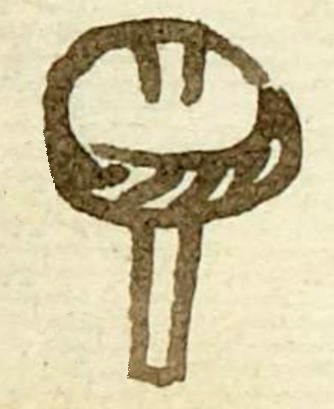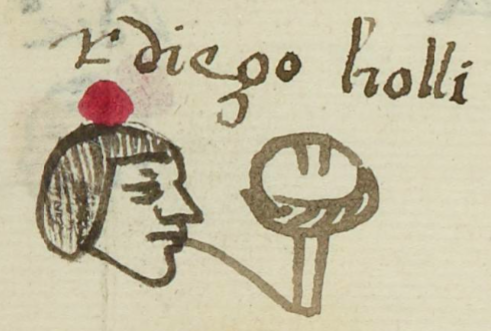Olin (MH618r)
This black-line drawing of the simplex glyph for the personal name Olin ("Movement" or "Earthquake") shows what appears to be a toy spinning top, vertical, with a disc on a stick, positioned up near the top. The edge of the disc is striped with black.
Stephanie Wood
If this is a toy spinning top, the use of this image as the simplex glyph for olin suggests European cultural influence. The gloss is ambiguous as to whether olin or olli is intended, but something spinning would suggest movement, making it olin. If this were olli (rubber, ball) a black rubber ball would enter into the glyph. Sometimes both are present together, one serving as a phonetic complement, and sometimes it is also a challenge to decide which is the intended name.
The edge of the spinning disk is something like the edge of one of the elements (olli) of the place name Olac (see below) as found in the manuscript collection Hospital de Jesús in the Archivo General de la Nación in Mexico City.
Olin was a day name in the 260-day divinatory calendar called the tonalpohualli in Nahuatl. This calendar had a role in various Mesoamerican religions, including the Mixtec.
Stephanie Wood
diego holli
Diego Olin
Stephanie Wood
1560
Jeff Haskett-Wood
juguetes, movimiento, peonza

ol(in), movement, https://nahuatl.wired-humanities.org/content/olin
Movimiento, o Temblor
Stephanie Wood
Matrícula de Huexotzinco, folio 618r, World Digital Library, https://www.loc.gov/resource/gdcwdl.wdl_15282/?sp=318st=image.
This manuscript is hosted by the Library of Congress and the World Digital Library; used here with the Creative Commons, “Attribution-NonCommercial-ShareAlike 3.0 License” (CC-BY-NC-SAq 3.0).




